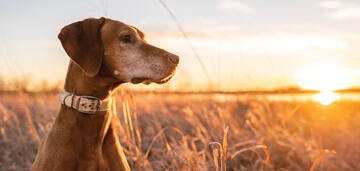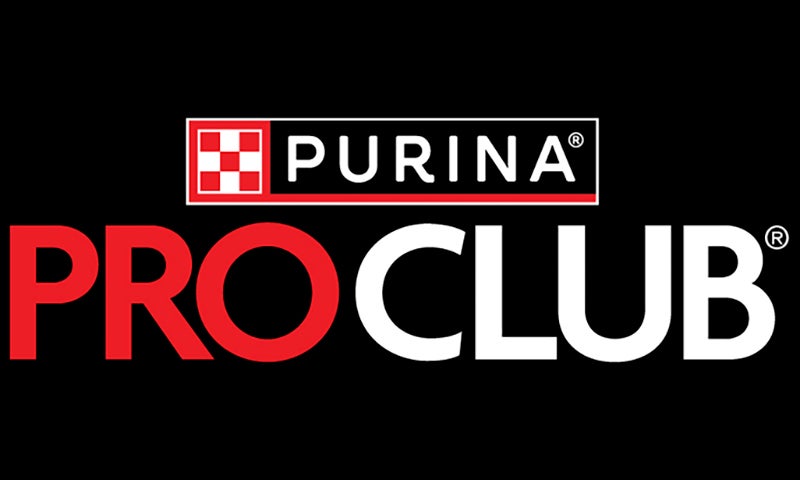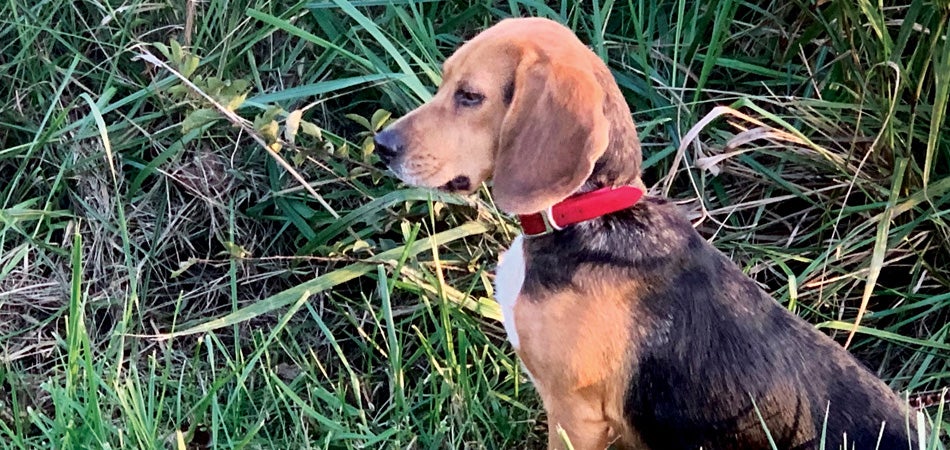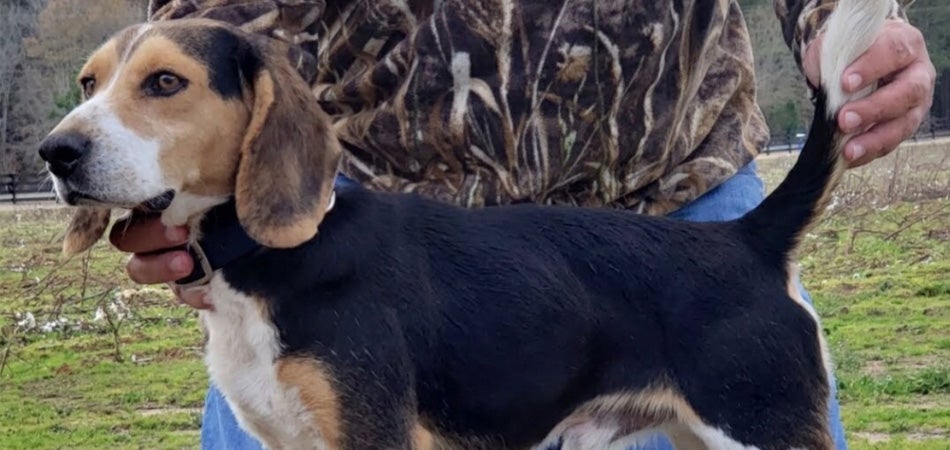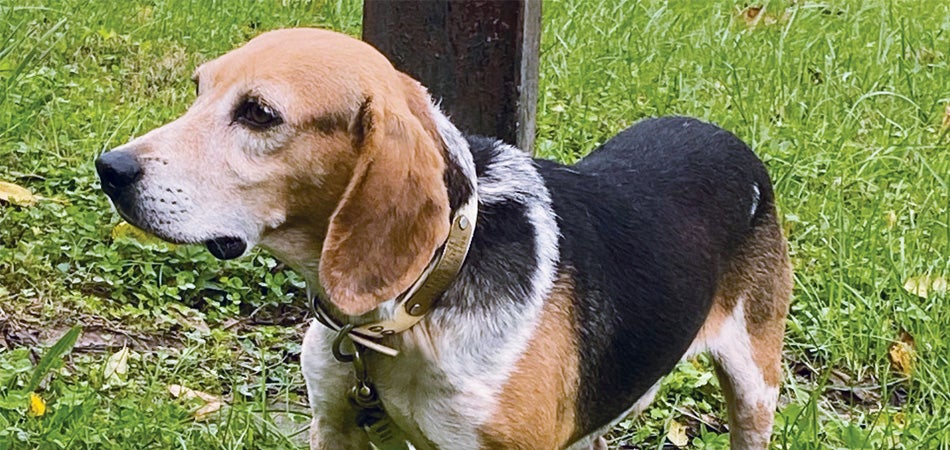By Barbara Fawver | Photos by Chris Mathan
On a cool, cloudy spring afternoon, the third day of the 2013 Southeastern Open All-Age Championship, a remarkably calm orange-and-white 2-year-old male named Just Irresistible stretched his front legs and looked around as though half-asleep.
Delivering the powerhouse Pointer to the breakaway, Judd Carlton, who was scouting for handler Jamie Daniels, knew once he let loose of the dog, a stylish, forward-running, quail-finding storm would overtake the Georgia countryside. Known as “Stud,” or rather, as “Stud Muffin” to owner Mary Devos, the bird dog, in his derby year, was a novice at field trials let alone at an open all-age championship stake.
“By the time Stud ran, many dogs had put down quality performances,” Jamie recalls. “I told Judd, ‘We’re going to have to do something to separate ourselves from the rest of the field.’ An indelible memory is what Just Irresistible made with Judd and me, both of us absolute rookies, along for the ride.”
About 20 minutes into the hourlong horseback stake Jamie saw they had a shot at winning and got gutsy with his handling, sending Stud to the opposite side of the hourglass field, away from his bracemate. The maneuver could have collapsed the whole effort but instead produced one of three outstanding quail covey finds.
“My wife, Allison, called him ‘The Butterfly Boy’ because when he moved, it looked as though he never touched the ground,” says Jamie.
An indisputable stellar show made Stud the first derby to win in the 23-year history of the Southeastern. “Stud pulled it off just perfect,” Jamie says. “That’s when he got me on the map, and he got himself on the map.”
Most would agree that running a derby in a major all-age championship is not the natural springboard to success. “An all-age dog is the baddest of the bad,” Jamie says. “They have to be strong and have more endurance because we ask a lot of them.”
That win at the Southeastern ignited Stud’s four-year field trial career. Bred by Jack and Tracy Haines, the 2XChampion/3XRunner-Up Champion took his wins between Jamie’s plantation obligations. As if not being privy to a full-circuit career wasn’t bad enough, tragically, a porcupine injury from his first summer on the South Dakota prairie haunted him years later, taking his life in his prime at 6 ½ years of age.
Jamie plans to repeat the formula that worked so well this fall when he hits the all-age circuit with Stud’s carbon-copy derby-age grandkids out of litters he bred. There’s Dominator’s Wild Bill and his littermate sisters, Dominator’s Maybelle, Dominator’s Queen Bee and Dominator’s Debutante, sired by NCH 2XCH 2XRUCH Miller’s Blindsider, called “Sam,” out of Dominator’s Red Wine. There’s Dominator’s Rebel Queen sired by Sam out of Pearl Again.
A String of Big Ol’ Liver Dogs
Curiosity landed Jamie Daniels at his first bird dog field trial, coincidentally, it was the 2001 Southeastern Open All-Age Championship. Working as a dog trainer at Longleaf Plantation in Thomasville, Georgia, he had noticed the field trial winners pictured in American Field magazines lying around.
“Where’s all this happening?” he asked.
“It’s happening right here in Thomasville, Albany and Alabama,” his manager told him.
“It was the end of quail season, and I had some time off,” Jamie says. “I told the manager I wanted to go up there and watch this championship.”
Jamie called in a favor knowing he would need a horse to watch the trial. A “green” colt was delivered to him at Chickasaw Plantation in Sasser, Georgia, where the Southeastern is run.
“Every afternoon a guy would take this string of big ol’ liver dogs off the trailer, and I would help him,” he says. “After the third day, he came over and asked me what my name was. He said, ‘What do you do for a living?’”
“I said, ‘I’m on a plantation down by Thomasville. I do the hunting, and I break the colts,’” Jamie continues.
“Well, I seen you ride that sorry colt you got. If you can ride him, you can ride anything I got. You want to go on the road with me?” asked Fred Dileo, a well-known all-age trainer and handler from Climax, Georgia.
“I asked, ‘What do you mean go on the road?’” says Jamie.
“Jump in the truck, and let’s go up and down the road to field trials,” Dileo replied.
That summer, Jamie went with Dileo to the South Dakota prairie to train dogs. “I always worked hard, but he sure did,” says Jamie.
“I learned from Fred that the key to a successful dog man is hard work. The harder you work, the luckier you get.”
Three years later, Jamie scouted for Fred when they won the 2004 Masters Open All-Age Championship with NFC 5XCH RUCH Funseeker’s Rebel. The white-and-liver ticked male called “Ty” went on to win the 2007 National Field Trial Championship, which helped him earn a record 3,968 points and be named the 2006-2007 Purina Top Field Trial Bird Dog. Dileo was honored as the Purina Outstanding All-Age Handler.
Dileo indoctrinated Jamie into the Rebel dogs — those big ol’ liver dogs Jamie helped him take off the trailer at the 2001 Southeastern. Ty was one. He was sired by CH Double Rebel Sonny, and his grandsire was CH Double Rebel Buck.
Dileo got hooked on the line begun in the early 1960s by Fred Arant Jr. of South Carolina through his mentor Tony Terrell of Texas and Dr. John Criswell of Oklahoma. Tough competitors with exceptional bird-finding acumen, the early Rebel dogs weighed around 70 pounds, which made them look like they ran slow though they moved fast.
Arant created the Rebel dogs through three generations of half brother to half sister crosses. The first breeding sired by Newman’s Delivery Dan out of Miss Mary Doone produced Rambling Rebel Dan, a Hall of Fame Pointer. He sired A Rambling Rebel, who won the Continental Open All-Age. His son, Hawk’s Rex, sired 2XNCH Whippoorwill’s Rebel, who won the National Field Trial Championship in 1987 and 1989.
Working with Dileo gave Jamie a foundation in field trial dogs though there were not enough dogs on the string to support two trainers. In 2005, Jamie took a job as manager of Caney Creek Plantation in Albany, Georgia. During his 11 years at Caney, Jamie developed a robust quail habitat at the 10,000-acre plantation while still helping Dileo at local trials and working dogs that needed fine-tuned.
All too soon, at age 46, Fred Dileo was killed in a terrible accident on Nov. 13, 2007. “When Fred died, he took part of me with him,” says Jamie. “I didn’t know if I wanted to do bird dogs anymore.”
One day unexpectedly Dileo’s clients Stan Howton and Rob Butler showed up at Caney Creek. Their Pointer, Elhew Sinbad, would have been a new dog on the circuit with Dileo.
“What are you doing?” they asked Jamie.
“I’m managing a plantation,” he replied.
“Get up. You’ve got dogs to work,” they told him.
“They kind of got me going again,” Jamie says.
The Bess & Scooter Cross
One of Dileo’s last breedings was a mating of his female, Cuivre River Daisy, a blue hen who produced quality dogs regardless of the stud, to 4XCH Just Wait, co-owned by Dr. Hunter Wilcox, Jack and Tracy Haines, and David Suitts. “Daisy” was linebred on Rebel dogs. Her sire, Double Rebel Sonny, was also the sire of National Champion Funseeker’s Rebel.
The litter produced 14 pups. The Haines’ stud fee puppy was a female whom they named Just Wait Bess. In 2010, Tracy Haines was looking for a stud dog to breed to “Bess.” She consulted Jamie, who had worked magic on a pup she had sent him from an earlier litter sired by Just Wait.
“I told Tracy I had just seen a dog out of Funseeker’s Rebel and Riverton’s Blackeye Pea that goes back to a dog of Fred’s we named A Frontline Rebel,” Jamie says. “She bred Bess to ‘Scooter’ (CH Riverton’s Funseeking Scooter). That’s where Stud came from.”
When Bess’ litter was born, Mary Devos was living with longtime friends of her family, the Haines, in Broomfield, Colorado, while attending the University of Colorado at Boulder. As a gift, Devos got to choose a pup.
“They were all white, and a couple had liver heads,” says Devos, who had high hopes her pup might turn out for the AKC field trials she enjoyed with her father. “I chose the male with the orange eyebrow patch.”
Three months later while on her spring break, Devos rode with Tracy Haines to deliver the Bess-Scooter litter to be evaluated by Jamie Daniels at Caney Creek. “The kennel was immaculate, and everything was so green and beautiful,” recalls Devos, conceding it helped to soften the bittersweetness of leaving behind her puppy.
“Even as a pup, Stud had something noticeably special that made him stand out,” remembers Jamie. “Working with him was like trying to lasso a tornado. He was a big, far runner, though he never ran off and never got lost. As he got older, he got really good at finding birds.”
After winning the 2013 Southeastern Open All-Age Championship in his derby year, Stud won the Border International Chicken Championship that September in Canada. He won Runner-Up at the 2014 Masters Open Quail Championship.
As a 4-year-old, Stud was the Top Qualifier in the first series of the 2015 Florida Open All-Age Championship, eventually winning Runner-Up Champion after two call-backs. Held at Chinquapin Plantation in Branford, the Florida Open All-Age is one of the toughest on the circuit. Its open, sandy terrain sprinkled with patches of wiregrass, briers and scrub oak is best-suited for a down-to-business bird finder. The memorial trophy is named for Fred Dileo, who was particularly fond of the venue and had won it in 1995 and 1996 with Double Rebel Buck, Stud’s great-great-grandsire on both sides of his pedigree.
At the 2015 Florida Open All-Age Championship, Stud ran three straight days. As was not uncommon during Stud’s career, Jamie handled him in the first series but had to return to Caney to manage a hunt. Rich Roberton stepped in to handle him in the call-backs to garner Runner-Up laurels.
Recalling Stud’s performance at the 2017 Southeastern Open Quail Championship, where Stud was Runner-Up Champion to his half sister, CH Dominator’s Dotted Line, Jamie says, “It was probably the best job I saw him do on ground application, and I was more amazed than anything. Although ‘Dot’ had three covey finds to his one, she did not beat Stud on the ground.”
Stud inherited from his Rebel relatives a natural talent to dig in and find birds. “Probably the biggest thing is he would never come from behind through the gallery,” says Jamie. “He was always up front. He has passed that ability on to his offspring.”
Hoping for a Nick
A potent producer, Stud was bred to eight females that produced 44 American Field winners. His offspring have thus far earned 295 wins or placements in all-age and shooting dog stakes. The A-list roster includes 14 Champions, seven are National Champions and two are Runner-Up National Champions, plus 17 Runner-Up Champions. Two are Purina Top Shooting Dogs and one is a Purina Amateur Field Trial Bird Dog.
A cross made to Jack and Fran Miller’s female, Miller’s Bring The Heat, was so successful, they made it three times, the last one via artificial insemination. The Millers, of Barwick, Georgia, had visited Jamie to work dogs. “Stud had class and grace when running and bird-finding ability second to none,” Fran Miller says. “We were hoping the traits we saw in Stud and what we had in our ‘Lacey’ would nick.”
It was a nick, indeed. The first litter Lacey whelped in February 2014 produced dogs that won 23 championships or runner-up championships, five were national wins. “Stud’s influence on our breeding program has been mind-blowing, and his contribution to our sport is undeniable,” says Fran Miller. “It is probably a once-in-a-lifetime nick. Every litter has been a clone of the one before.”
The Millers sold several pups as derbies to pro trainers George and Mike Tracy of Summerhill Kennels in Glenville, Pennsylvania, who brought on owners to support their campaigns. A superstar from Lacey and Stud’s first litter trained at Summerhill was NCH 10XCH 2XRUCH Miller’s Unbridled Forever, who won the 2019 National Amateur Invitational Championship handled by Brian Sanchez of Great River Kennel in Central Islip, New York, co-owner with Neil Walker. Yearlong success made “Will” the 2019-2020 Purina Amateur Shooting Dog. In 2021, Will won the Atlantic Coast and Southeastern Open Shooting Dog Championships handled by Mike Tracy.
A second-litter high achiever is 4XCH RUCH Miller’s Heat Seeker. “Woody,” handled by George Tracy for co-owners Bill and Muriel Primm, Dennis Hood, and Jack and Fran Miller, won the 2021 New England, National Pheasant and Northeastern Open Shooting Dog Championships and was Runner-Up Champion at Garden State. Woody’s first win was the 2019 Georgia Open.
The Tracy team also trained and handled from Lacey and Stud’s second litter CH RUCH Miller’s Just Plain Rowdy for owner Allen Linder and 2XRUCH Miller’s Locked and Loaded for the Primms. From the third litter, there are 2XRUCH Miller’s Record Heat, owned by Linder; CH RUCH Miller’s High Heat Index, owned by Casey Hollander and Stanton Harrell; and RUCH Miller’s Extreme Heat, the 2019-2020 Purina Derby Top Shooting Dog, owned by Joe McHugh.
“Often, you’ll see breeders get a good nick and a good litter, but when they repeat the breeding, they don’t get anything,” Mike Tracy says. “It’s amazing that Lacey’s three litters with Stud produced so many good dogs. These are smart, bird-finding dogs that are friendly and nice to be around.”
The Millers started all the Lacey-Stud pups on birds. One they own from the third litter is the 2020 National Amateur Shooting Dog Derby Champion, Miller’s Packing Heat, a female handled by Fran Miller.
Senah Plantation owner Benjy Griffith of Leesburg, Georgia, bought interest in three males from the first Lacey-Stud litter in the fall of 2015 with the understanding that Jack and Fran Miller would run them in their derby year. Fran Miller handled a pup called “Dan” (NCH 2XCH 5XRUCH Miller’s Unfinished Business) to his win at the 2016 Masters Open Shooting Dog Championship. Then, she ran Dan in the 201 7 National Amateur Free-For-All, where he was the Runner-Up Champion, qualifying him for the 2017 National Amateur Invitational, where he added another Runner-Up Champion to his record.
Senah Plantation head trainer Joel Norman handled Dan and won the 2018 National Open Shooting Dog Championship, repeated his championship win at the 2019 Masters, and took Runner-Up at the 2020 and 2021 Masters. A cross-over to all-age stakes netted Dan Runner-Up at the 2021 Florida Open All-Age Championship.
In 2022, Norman plans to try all-age stakes with Dan’s littermate, CH RUCH Miller’s Stray Bullet, and with Dan’s son — Stud’s grandson —- NCH CH Senah’s Back In Business, the 2021 National Open Shooting Dog Champion. When “Nate” won the National in 2021, it was the second time in the 60-year history of the National Open that a father and his son had won.
“These dogs have that desire and range to run in all-age,” Norman says. “Although they were started and handled as shooting dogs, they are smart and honest. They look for you to give them direction, and they respond. They are very competitive.”
Other notable all-age dogs sired by Stud include 4XCH Showtimes Sam Houston, whom owner Larron Copeland handled to win the 2019 and 2021 Continental Amateur All-Age Championships. Copeland also handled CH Showtimes Mocking Jay, the 2020 National Amateur Quail Champion and the 2019-2020 Purina Amateur Top Field Trial Dog. Respectively, their dams are KF Alias and Thin Ice.
Stud sired 3XRUCH Seekin a Thrill, a male whom owner Ross Leonard handled to Runner-Up at the 2020 National Amateur Shooting Dog Invitational and at the 2021 Mississippi Open Shooting Dog Championship. A female, 4XCH 2XRU CH Thrill Me, handled by Tommy Rice and owned by Keith Finalyson, was the 2019 National Open Shooting Dog Champion. Both Pointers are out of Snow Thrill.
‘I Think We’re There’
Having recently moved to a farm in Dawson, Georgia, Jamie is looking forward to this chapter of his life as he and his wife, Allison, raise their two young children. Besides breeding, training and handling all-age dogs, Jamie taps into his plantation background as a real estate broker setting up land sales for buyers of hunting preserves.
As Jamie walks through his kennel, it is quiet with no barking dogs, a signature of the laidback, mellow nature of the Rebel dogs. “My goal is to preserve the Rebel bloodline,” he says. “Fred (Dileo) was working toward the same thing — breeding a smaller, classier dog that looks fancy but has the Rebel ability to find game.”
When Dileo died, Jamie got Pearl Again, a half sister to Stud’s dam, Just Wait Bess. Jamie bred Pearl Again to CH Riverton’s Funseeking Scooter, Stud’s sire, and got Dominator’s Rebel Heir, Stud’s half brother. “Rebel” won the 2017 Florida Open All-Age Championship — and the Fred Dileo Memorial Trophy.
“I knew Rebel had won it when we got done, and I don’t normally feel that way. I am a sentimental guy, so it was quite emotional to win,” he says.
As to Stud, he was Mary Devos’ first and only all-age dog. “I sometimes worked three jobs while going to school to support his campaign,” she says. “It was pretty cool how I got so lucky with him.”
Stud was Jamie’s first Open All-Age Champion. “Everybody’s got to have that one dog that motivates them,” he says. “He would be it for me.”
A few straws of Stud’s frozen semen remain. “I wish we had bred him more,” Jamie says.
“If he could come around now, the world would be his oyster,” he reflects. “At the time, I was a very new handler in the sport, and I am sure I made every mistake a handler could make. Despite my novice skills, he excelled and taught me to trust more and handle better. He pulled me into the winner’s circle with him. At the time, I was unaware of just how special he would be not only to me but to our sport.”
Satisfaction comes from knowing that Stud stamps his best qualities into his children and now his grandchildren. “When I leave this game, I want people to go back and remember the Dominator dogs,” Jamie says. “The No. 1 thing you can hope for as a breeder is to leave a line better than you found it. I think we’re there.”
